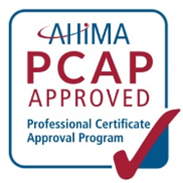Health Information Management (HIM) is the collection, analysis, storage and protection of the quality of patient health information.
HIM technicians ensure that patients' medical records are accurate, complete, and timely.
Health information employees assure that medical records are maintained in a secure manner to protect patients' rights to privacy. They expedite patient requests for information, as well as transmission of information from physician to physician, provider to insurance company and/or facility to government funded programs and agencies (Medicare, Medicaid, Center for Disease Control).
HIM technicians may become release of information officers, computer software specialists, informatics technicians, trainers and managers.

Learn More
-
AHIMA Professional Certificate Approval Program (PCAP)
ΊμΠΣΦ±²₯'s Health Information Management and Medical Coding programs are approved by the American Health Information Management Association (AHIMA) Professional Certificate Approval Program (PCAP). This designation acknowledges the coding program as having been evaluated by a peer review process against a national minimum set of standards for entry-level coding professionals. This process allows academic institutions to be acknowledged as offering an approved coding certificate program.
The AHIMA PCAP designation:
- Identifies specialized programs that meet established coding educational standards
- Stimulates improvement of educational standards through faculty development opportunities, and by involving faculty and staff in program evaluation and planning
- Promotes a better understanding of the goals of professional coding education
- Provides reasonable assurance that practitioners possess the necessary job skills upon entry into the profession
-
National Trends
- Health Information Technician ranks 55th on the list of 100 best jobs. (US News and World Report)
- On average, .
- .
- Employment for technicians in medical records and health information will increase by 27,800 in the 10-year period 2016-2026. (U.S. Bureau of Labor Statistics)
-
Healthcare Facilities
- 88% of Health Care Facilities surveyed recently had immediate openings in their Health Information Management Departments.
- 67% of these facilities anticipated openings in their Health Information Departments in the coming year.
- 78% of Hiring Managers anticipated openings within the next two to five years.
- 64% of Hiring Managers required Auditors to have a credential upon hire.
- 14% of Hiring Managers required Release of Information personnel to have HIM education and/or a credential upon hire.
-
Local Employers
- Baystate Health Systems
- Berkshire Health Systems
- Columbia Memorial Hospital
- Ellis Medicine
- Holyoke Hospital
- St. Peter's Health Partners
- Saratoga Hospital
- Veteran's Affairs Medical Center; Leeds, MA
- Stratton VA Medical Center; Albany, NY
-
Expected Outcomes
Graduates of this program should be able to:
- Describe health care organizations from the perspective of key stakeholders.
- Apply policies, regulations, and standards in the management of information.
- Identify policies and strategies to achieve data integrity.
- Determine compliance of health record content within the health organization.
- Explain the use of classification systems, clinical vocabularies, and nomenclatures.
- Apply privacy strategies to health information.
- Apply security strategies to health information.
- Identify compliance requirements throughout the health information life cycle.
- Describe the concepts of managing data.
- Determine diagnosis and procedure codes and groupings according to official guidelines.
- Evaluate revenue cycle processes.
- Evaluate compliance with regulatory requirements and reimbursement methodologies.
- Apply legal processes impacting health information.
- Demonstrate compliance with external forces.
- Identify the components of risk management related to health information management.
- Identify the impact of policy on health care.
- Demonstrate fundamental leadership skills.

Contact Us
Laurie Vilord, Program Advisor
lvilord@berkshirecc.edu
413-236-4682
Health Information Technologist and Medical Registrar Wages in MA*
- Median hourly wage: $41.22
- Annual mean wage: $85,740
*Source:


